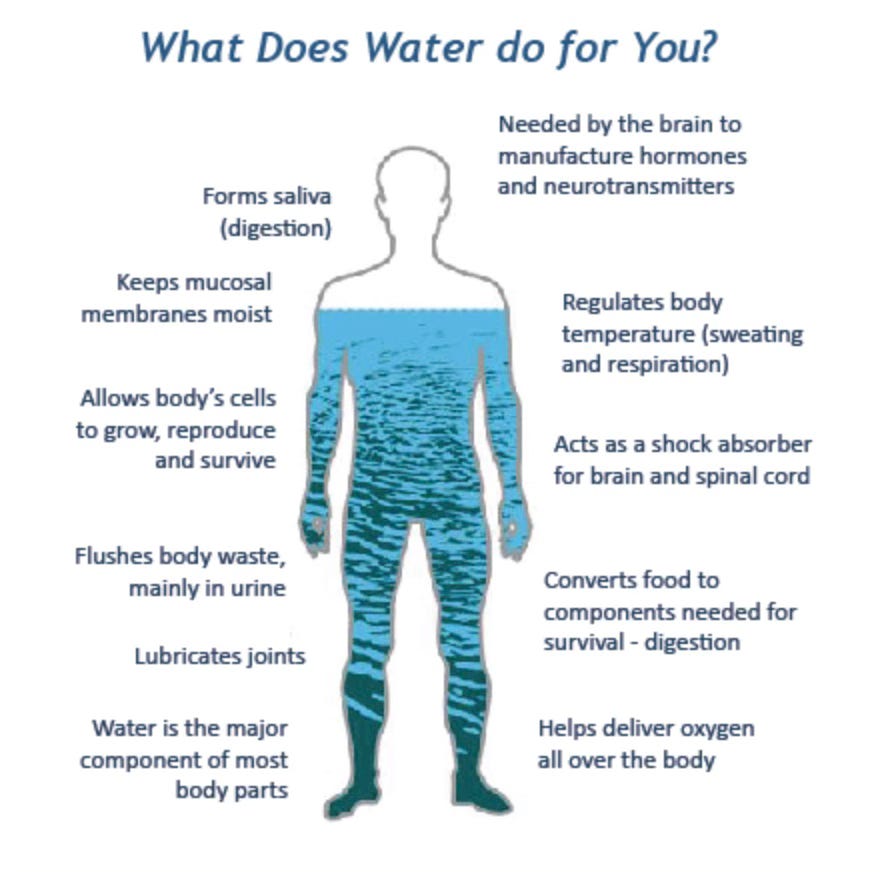How Much Water You Really Need
Water is essential for life, but you don’t need to overdo it.
Why You Need Water
We lose fluid all day long and have few reserves in our body to replenish it. That’s why you shouldn’t go very long without adequate water intake.
Water is involved in virtually every bodily function. It:
Helps regulate your internal body temperature
Act as a medium for bodily functions that keep you alive
Forms saliva and is a part of blood
Assists in flushing waste out of the body as part of urine
Is vital for the transportation of nutrients within the body
Helps maintain proper heart function
Assists in preventing constipation
Sources/Usage: Public Domain. View Media Details
How Much Water Do You Need?
We lose water breathing and by cooling our bodies. Urination is a major source of lost fluid. The kidneys constantly filter your blood. Water and certain compounds are directed back into the bloodstream while the waste products of metabolism and excess fluid are excreted. Urine production depends on many factors including how much you eat and drink.
You’re hydrated when your fluid losses are balanced by your fluid intake. With the exception of physically active people or those working or exercising in a hot environment, women need about 91 ounces of water daily while men require about 125 ounces, according to the Institute of Medicine, Food and Nutrition Board (now known as the National Academy of Medicine).
One of the simplest ways to know you’re properly hydrated is by checking your urine. Pale yellow or clear urine typically indicates adequate hydration, while dark yellow or brown urine means your body isn’t producing enough urine. Signs of dehydration also include fatigue, dizziness, confusion, or low blood pressure.
Where to Get the Fluid You Need
Plain water is the obvious choice for satisfying fluid needs, but social media influencers, bottled water companies, and water bottle companies (think Stanley cup) may lead you to believe that you need more water than you actually require. That’s because you can get enough water from the other fluids, and foods, that you consume.
Coffee and tea, and yes, even the caffeinated kind, help satisfy fluid requirements. Though caffeine increases urine production and is considered a diuretic, research suggests that the fluid in caffeinated beverages balances their potential to cause water loss. If you regularly drink moderate amounts of coffee or tea daily, caffeine shouldn’t be an issue.
Dairy milk, plant milk, juice, and other soft drinks are also mostly water. It may come as a surprise that beer and wine are also fluid sources, but it’s probably not a good idea to rely on them as such.
Nearly all food has water in it, but fresh, frozen, and canned plain fruits and vegetables have the most. Here are some examples of the water content of fruits and vegetables.
The Bottom Line on Water Intake
Your body has a simple way of letting you know you need fluid: thirst. If you’re thirsty, drink water. On very hot days when you’re outside you may need more water before your thirst mechanism tells you so. There’s no need to go overboard, though. Drinking 64 to 128 ounces of water from a designer water bottle won’t flush out toxins any faster or help your kidneys function more efficiently.
Do you get enough water? Let me know!







Water is the best drug known to man. Unlike those known drugs that affect a particular part of the body, water affects all our organs and systems positively.
I've come across the advice to just follow your thirst before but when I track my fluid intake I never end up getting to the recommended intake level unless I make a very conscious effort to do so..... is that not the norm? I feel like I drink more water than others so I'm surprised if most people get enough without making a conscious effort....